Adams J.T. Empire on the Seven Seas. The British Empire 1784-1939
Подождите немного. Документ загружается.

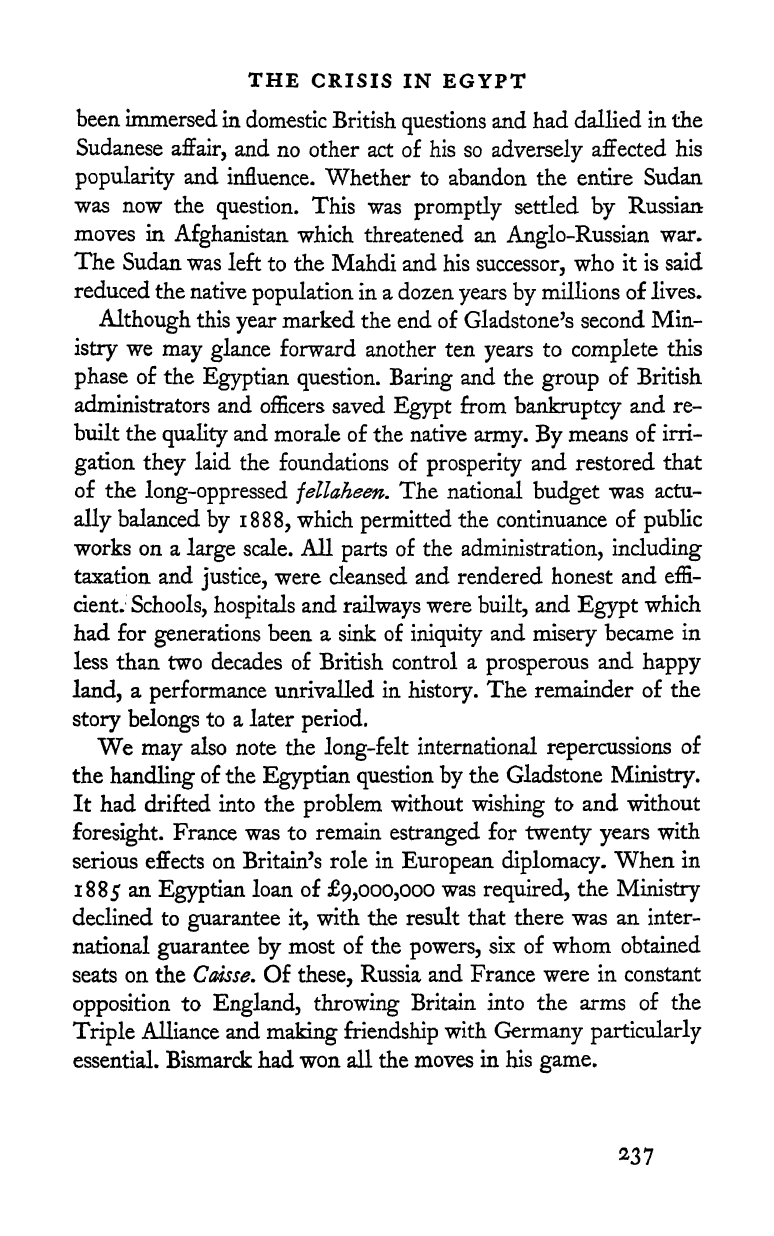
THE
CRISIS IN
EGYPT
been
immersed
in
domestic
British
questions
and had
dallied
in
the
Sudanese
affair,
and
no
other
act
of
his so
adversely
affected his
popularity
and
influence. Whether
to abandon the entire
Sudan
was
now the
question.
This was
promptly
settled
by
Russian
moves
in
Afghanistan
which threatened
an
Anglo-Russian
war.
The
Sudan was
left
to
the
Mahdi and
his
successor,
who
it
is
said
reduced
the
native
population
in a dozen
years
by
millions
of
lives.
Although
this
year
marked
the
end
of
Gladstone's
second
Min-
istry
we
may
glance
forward
another ten
years
to
complete
this
phase
of the
Egyptian
question.
Baring
and
the
group
of British
administrators
and
officers saved
Egypt
from
bankruptcy
and
re-
built
the
quality
and
morale of
the native
army.
By
means of
irri-
gation they
laid
the
foundations
of
prosperity
and restored
that
of
the
long-oppressed
fellaheen.
The
national
budget
was
actu-
ally
balanced
by
1888,
which
permitted
the continuance
of
public
works on
a
large
scale.
All
parts
of
the
administration,
including
taxation and
justice,
were
cleansed and rendered
honest
and
effi-
cient.
Schools,
hospitals
and
railways
were
built,
and
Egypt
which
had for
generations
been
a sink of
iniquity
and
misery
became
in
less
than two decades of British control
a
prosperous
and
happy
land,
a
performance
unrivalled
in
history.
The remainder
of
the
story
belongs
to a
later
period.
We
may
also
note the
long-felt
international
repercussions
of
the
handling
of
the
Egyptian
question
by
the Gladstone
Ministry,
It
had drifted
into the
problem
without
wishing
to
and without
foresight.
France
was to
remain
estranged
for
twenty
years
with
serious effects
on Britain's
role in
European
diplomacy.
When
in
1885
an
Egyptian
loan
of
9,000,000
was
required,
the
Ministry
declined to
guarantee
it,
with the
result that
there was an inter-
national
guarantee
by
most of the
powers,
six of
whom
obtained
seats
on
the
Caisse.
Of
these,
Russia
and
France
were in
constant
opposition
to
England,
throwing
Britain
into
the arms of
the
Triple
Alliance
and
making
friendship
with
Germany particularly
essential.
Bismarck
had won
all the
moves
in
his
game.
237
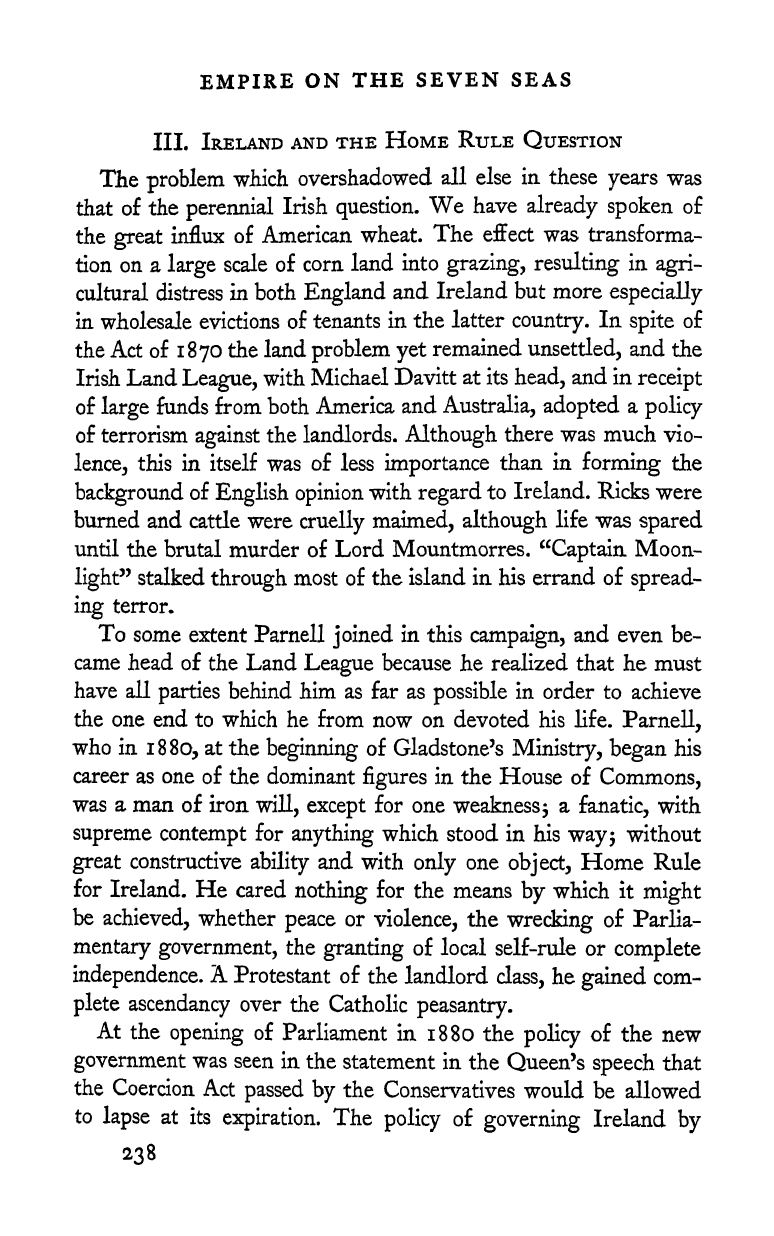
EMPIRE
ON
THE
SEVEN
SEAS
III.
IRELAND
AND
THE
HOME
RULE
QUESTION
The
problem
which
overshadowed
all else
in these
years
was
that
of
the
perennial
Irish
question.
We have
already
spoken
of
the
great
influx
of
American
wheat.
The
effect
was
transforma-
tion
on a
large
scale
of
corn
land
into
grazing,
resulting
in
agri-
cultural
distress
in both
England
and
Ireland
but
more
especially
in
wholesale
evictions
of
tenants
in
the
latter
country.
In
spite
of
the Act
of
1870
the
land
problem
yet
remained
unsettled,
and
the
Irish Land
League,
with
Michael
Davitt
at
its
head,
and
in
receipt
of
large
funds
from both
America
and
Australia,
adopted
a
policy
of
terrorism
against
the
landlords.
Although
there
was
much
vio-
lence,
this in
itself
was
of less
importance
than
in
forming
the
background
of
English
opinion
with
regard
to
Ireland.
Ricks were
burned
and cattle
were
cruelly
maimed,
although
life
was
spared
until
the brutal
murder of
Lord
Mountmorres.
"Captain
Moon-
light"
stalked
through
most of
the
island in
his
errand
of
spread-
ing
terror.
To
some
extent
Parnell
joined
in
this
campaign,
and even
be-
came
head
of
the
Land
League
because
he
realized
that he
must
have all
parties
behind him as far as
possible
in
order
to achieve
the one end
to
which he from
now
on
devoted his life.
Parnell,
who in
1880,
at
the
beginning
of
Gladstone's
Ministry,
began
his
career
as one
of the
dominant
figures
in
the House
of
Commons,
was
a
man
of
iron
will,
except
for
one
weakness
j
a
fanatic,
with
supreme contempt
for
anything
which stood
in
his
wayj
without
great
constructive
ability
and
with
only
one
object,
Home
Rule
for
Ireland.
He cared
nothing
for
the
means
by
which it
might
be
achieved,
whether
peace
or
violence,
the
wrecking
of Parlia-
mentary
government,
the
granting
of
local
self-rule
or
complete
independence.
A
Protestant of
the
landlord
class,
he
gained
com-
plete
ascendancy
over
the
Catholic
peasantry.
At
the
opening
of
Parliament
in
1880
the
policy
of
the
new
government
was
seen in
the
statement in
the
Queen's
speech
that
the
Coercion
Act
passed
by
the
Conservatives
would
be allowed
to
lapse
at
its
expiration.
The
policy
of
governing
Ireland
by
238
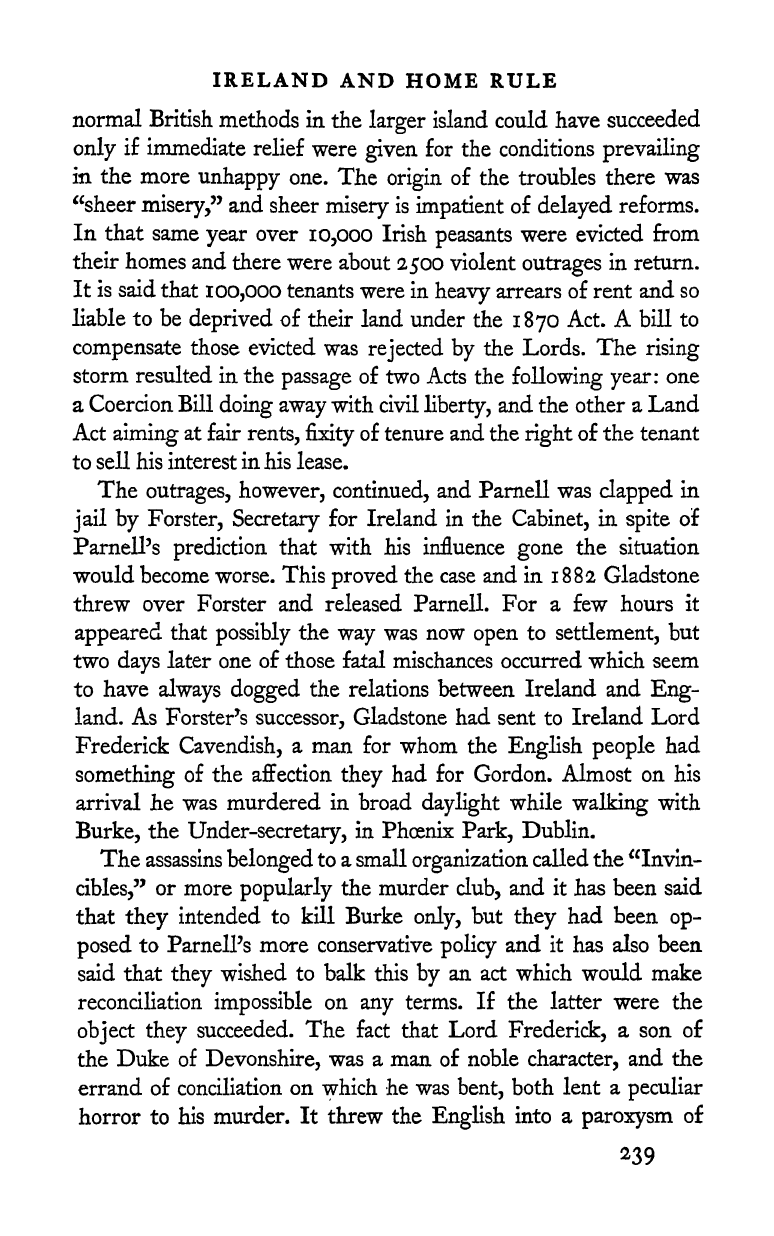
IRELAND
AND
HOME
RULE
normal British
methods in the
larger
island could have
succeeded
only
if
immediate
relief
were
given
for the conditions
prevailing
in
the
more
unhappy
one.
The
origin
of the troubles there
was
"sheer
misery,"
and
sheer
misery
is
impatient
of
delayed
reforms.
In that
same
year
over
10,000
Irish
peasants
were
evicted
from
their homes
and
there were
about
2500
violent
outrages
in return.
It
is
said
that
100,000
tenants
were
in
heavy
arrears of
rent
and
so
liable to be
deprived
of
their land
under
the
1870
Act. A
bill
to
compensate
those evicted
was
rejected
by
the
Lords.
The
rising
storm
resulted
in the
passage
of
two
Acts
the
following
year:
one
a
Coercion
Bill
doing
away
with civil
liberty,
and the other
a
Land
Act
aiming
at
fair
rents,
fixity
of tenure
and
the
right
of
the
tenant
to
sell his
interest
in his lease.
The
outrages,
however, continued,
and Parnell was
clapped
in
jail
by
Forster,
Secretary
for Ireland in
the
Cabinet,
in
spite
of
Parnell's
prediction
that with his
influence
gone
the
situation
would become
worse.
This
proved
the case
and in 1882
Gladstone
threw
over Forster and released Parnell.
For a
few hours
it
appeared
that
possibly
the
way
was
now
open
to
settlement,
but
two
days
later one
of
those fatal
mischances
occurred
which
seem
to
have
always
dogged
the relations
between
Ireland and
Eng-
land. As
Forster's
successor,
Gladstone
had
sent to Ireland.
Lord
Frederick
Cavendish,
a
man
for
whom
the
English people
had
something
of the affection
they
had
for
Gordon.
Almost on his
arrival he
was
murdered in broad
daylight
while
walking
with
Burke,
the
Under-secretary,
in Phoenix
Park,
Dublin.
The assassins
belonged
to
a small
organization
called the
"Invin-
cibles,"
or
more
popularly
the
murder
club,
and
it
has
been
said
that
they
intended
to
kill Burke
only,
but
they
had been
op-
posed
to
Parnell's more conservative
policy
and
it
has also been
said
that
they
wished
to
balk this
by
an act which would make
reconciliation
impossible
on
any
terms.
If
the
latter were the
object
they
succeeded.
The
fact
that
Lord
Frederick,
a
son of
the
Duke of
Devonshire,
was a man
of
noble
character,
and the
errand
of conciliation
on which he was
bent,
both
lent a
peculiar
horror
to
his
murder. It threw
the
English
into a
paroxysm
of
239

EMPIRE
ON
THE
SEVEN
SEAS
anger
and
made
them
feel
that
whatever
they
tried to
do,
noth-
ing
would
satisfy
the
Irish.
Parnell,
who
had
broken
with
the
extremists
and
had
replaced
the
Land
League
by
a
National
League
whose
only
object
was
Home
Rule,
was
horrified
and offered
to
resign
his
seat
in. Parlia-
ment. He
told
Davitt
that
he
felt as
though
he
himself
had
been
stabbed
in
the
back,
and
in fact
the
murder club
had
temporarily
ruined
his
cause.
A new
Crimes
Act
obviously
had to
be
passed,
and
it
was
provided
in it
that the
police
should
have
right
of
summary
arrest
and that
even
grave
crimes
could
be
tried
by
three
judges
without
a
jury.
On the
other
hand
the
policy
of
appease-
ment
was
still
pursued,
and
Acts
were
passed
for
cancellation
of
arrears
of rent.
Parnell
wished
for
a
period
of
peace
and
to
a
considerable
extent
suspended
his
policy
of
blocking
the
opera-
tion
of
Parliament
by
the
Irish
members.
Yet
the
reign
of violence
continued,
including many
murders
in Ireland
and
dynamite
out-
rages
in London.
In
spite
of
the failures
recorded,
the
Ministry
had
important
domestic
reforms
to
its
credit,
such as
the
Act
making
employers
liable
for
damages
in
case
of
accidents to their
employees,
and
the
Act
finally
abolishing flogging
in
both
army
and
navy.
The
Married Women's
Property
Act,
which
for
the
first time
gave
a
married
woman the
same
control
over
her own
property
that
a
spinster
would
have,
was
passed
in
1882
and
was
one of
the
mile-
stones
in
the
woman's
movement.
The
great
Act
of the
Ministry,
however,
was
the
third
Reform
Bill
(1884),
which
gave
more
citizens the
franchise
than
the
earlier two
Reform Bills had
together.
The
first
had
given
the
vote
to
a
large
part
of the
middle
class
}
the
second
to
a
large
part
of
the
workers in
the
towns and
trades,
but the
rural
popula-
tion
had
been
neglected.
In
vivid
contrast
to
the
great popular
excitement
in
1832,
there had been
little
general
interest taken
in
the
matter,
although
Mr.
G. O.
Trevelyan
had
continually
maintained
the
cause in the
Commons.
In
that
House there
was
no
opposition
to
the
measure
when
it
was
introduced
but
as
usual
it
was
blocked
by
the
Lords,
who,
however,
agreed
to
a
com-
240
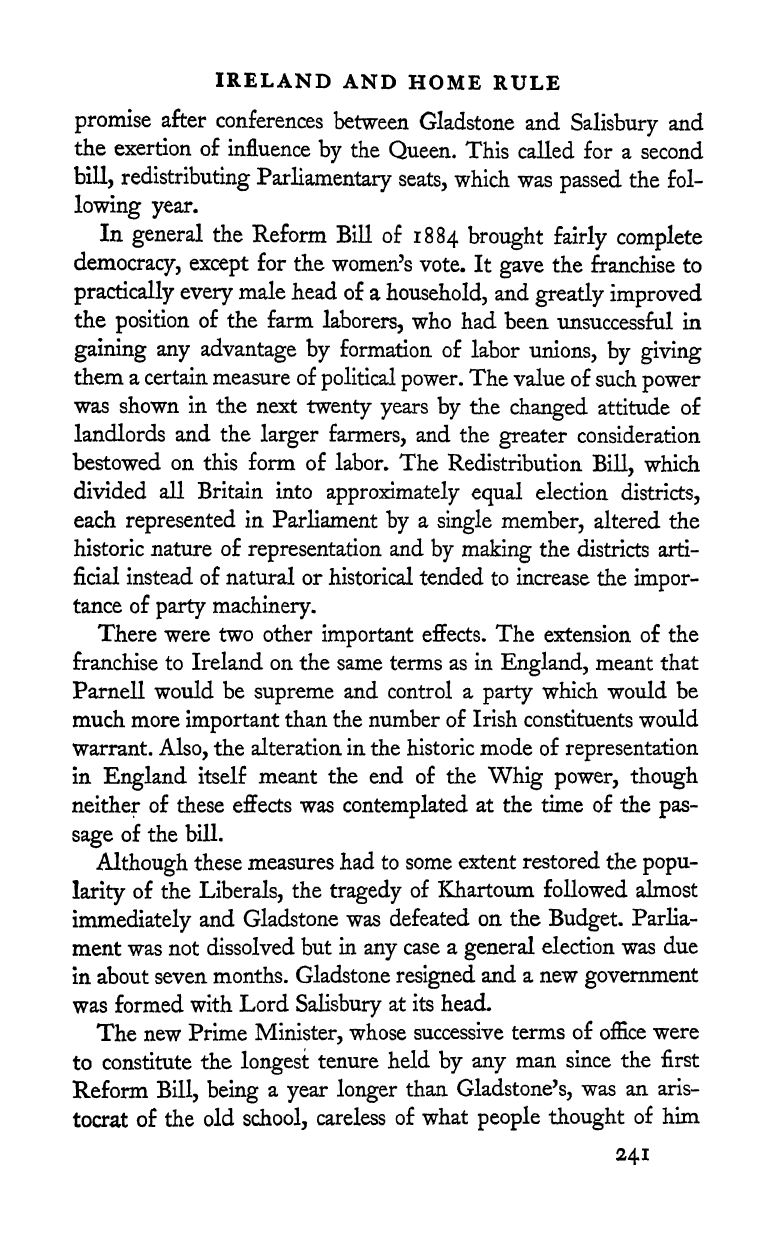
IRELAND
AND
HOME
RULE
promise
after
conferences
between
Gladstone and
Salisbury
and
the exertion
of
influence
by
the
Queen.
This called
for a
second
bill,
redistributing
Parliamentary
seats,
which was
passed
the fol-
lowing
year.
In
general
the
Reform Bill
of
1884
brought fairly
complete
democracy,
except
for
the
women's
vote.
It
gave
the
franchise
to
practically
every
male head
of
a
household,
and
greatly
improved
the
position
of
the
farm
laborers,
who
had
been
unsuccessful
in
gaming
any
advantage by
formation of
labor
unions,
by
giving
them a certain
measure of
political
power.
The
value
of
such
power
was
shown
in
the next
twenty
years
by
the
changed
attitude
of
landlords and the
larger
farmers,
and
the
greater
consideration
bestowed
on this
form
of
labor.
The
Redistribution
Bill,
which
divided
all
Britain into
approximately
equal
election
districts,
each
represented
in
Parliament
by
a
single
member,
altered
the
historic nature
of
representation
and
by
making
the
districts
arti-
ficial instead of natural
or
historical
tended
to
increase
the
impor-
tance of
party machinery.
There
were
two other
important
effects.
The
extension of the
franchise
to Ireland on the same
terms
as in
England,
meant that
Parnell
would be
supreme
and
control
a
party
which would
be
much more
important
than the
number of
Irish constituents would
warrant.
Also,
the alteration
in
the
historic mode
of
representation
in
England
itself meant
the
end of the
Whig
power,
though
neither
of
these
effects was
contemplated
at
the
time
of the
pas-
sage
of
the
bill.
Although
these
measures had
to
some
extent restored
the
popu-
larity
of the
Liberals,
the
tragedy
of
Khartoum
followed
almost
immediately
and Gladstone
was
defeated on the
Budget.
Parlia-
ment
was not
dissolved but
in
any
case
a
general
election was
due
in about seven
months.
Gladstone
resigned
and a new
government
was
formed
with
Lord
Salisbury
at
its
head.
The new
Prime
Minister,
whose
successive terms
of
office
were
to
constitute
the
longest
tenure held
by any
man since
the
first
Reform
Bill,
being
a
year longer
than
Gladstone's,
was an
aris-
tocrat
of
the
old
school,
careless
of
what
people
thought
of
him
241

EMPIRE
ON
THE SEVEN SEAS
and
heartily
despising
modern
methods
of
publicity.
Grave
and
distinctly
intellectual
in
type,
he
had character
and
principles
al-
though
lacking
in
broadly
constructive
views
and
with little
in-
terest
in democratic
reforms.
His
great
service
was
to be
later
in
the international
partition
of
Africa,
but his
first
Ministry,
which
lasted
only
until the
election,
was
marked
by
little
except
the
annexation
of
Upper
Burma
to
the
Empire
and
the
passing
of an
Act to facilitate the
purchase
by
Irish tenants
of
land from
its
owners.
We have
already spoken
of
the
solid
block
of Irish
votes
in
the
House and the
controlling
influence
of
ParnelL
During
the
few
months
the
Conservatives
were
in
power
they gave
the
impression
that
they
were
favorable
to the
Irish
cause,
and
before
the
election
Lord
Carnarvon,
the Conservative
Viceroy
in
Ireland,
with
Salis-
bury's
knowledge, gave
Parnell
the
impression
that if elected
the
party
would
be in favor
of
some kind
of home
rule
for the island.
Gladstone
also was
moving
toward
the same
sort of
settlement but
he
made no
statement,
and
Parnell therefore
backed
the Conserva-
tives.
Gladstone had asked
the
voters to
give
the
Liberals
a
major-
ity
which would
enable
them
to control
Parliament without
the
Irish
bloc,
but
the
returns,
although
they
showed a Liberal
ma-
jority
over
the
Conservatives
of
86,
also
showed
that Parnell
had
secured
86
members
out of
103
in Ireland
pledged
to Home Rule.
This
gave
the Conservatives
and Parnellites
combined four
more
votes
than
the
Liberals and
made Parnell
the
deciding
factor be-
tween
the
two British
parties.
The
fact that
the
Irish,
outside
of
Ulster,
had
returned
86
members
pledged
to
Home
Rule
as
against only
17
unpledged,
so
clearly
indicated
the
wish
of
a
united
people
that
Gladstone
now believed some
sort
of
Home Rule to
be
inevitable
if
Ireland
were to
be
governed
in
peace.
So
intent was
he on
securing
this result
that
he offered
Salisbury
his
aid if
the
Conservatives
would
bring
forward
some measure
to
gain
the
end
in
view,
but the Prime
Minister
rejected
his
advances.
Convinced of
the
necessity
for
action
and
that the
Conservatives
would
not
take
it,
he
allied himself
with
the disillusioned
Parnell
and
with
the
help
of
the Irish
defeated the
Government,
which
242'
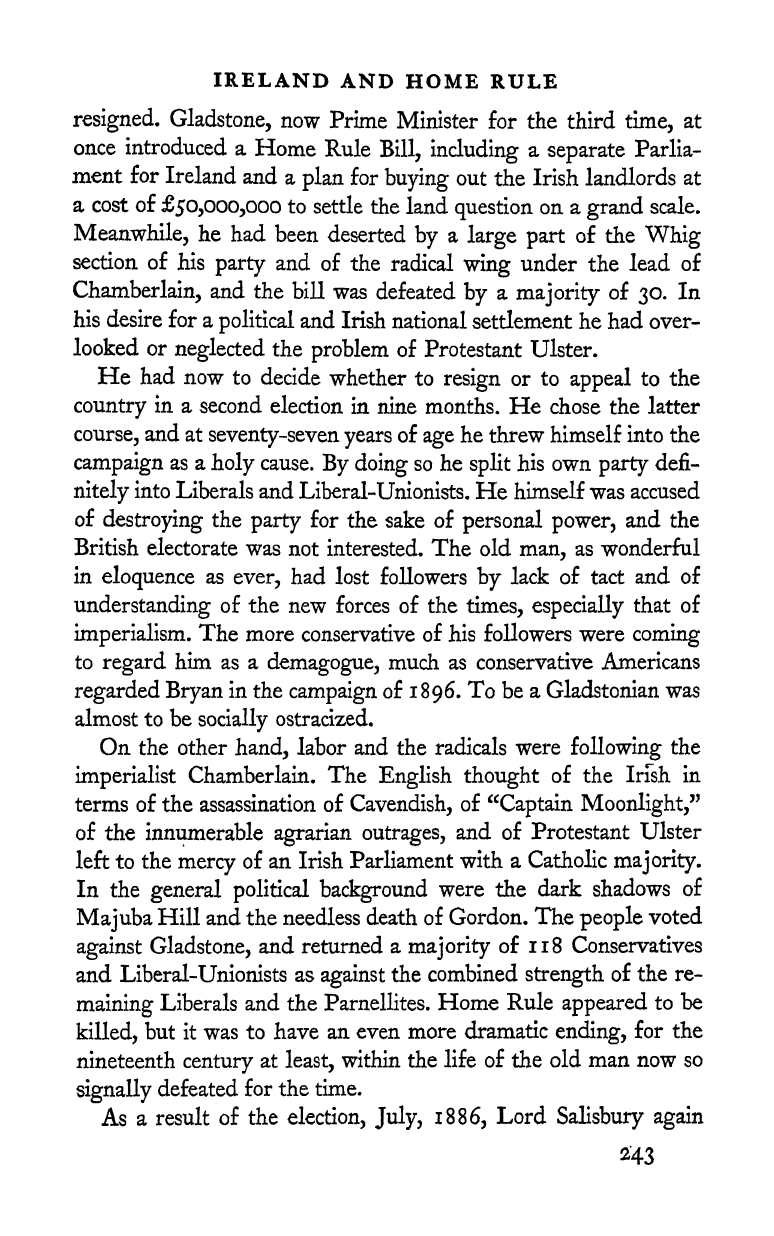
IRELAND
AND
HOME RULE
resigned.
Gladstone,
now
Prime
Minister
for the third
time,
at
once
introduced
a
Home
Rule
Bill,
including
a
separate
Parlia-
ment
for
Ireland
and
a
plan
for
buying
out the Irish landlords
at
a
cost
of
50,000,000
to
settle the
land
question
on a
grand
scale.
Meanwhile,
he
had
been
deserted
by
a
large
part
of
the
Whig
section of
his
party
and
of the
radical
wing
under the
lead of
Chamberlain,
and the
bill
was
defeated
by
a
majority
of
30.
In
his desire
for
a
political
and
Irish national
settlement
he had over-
looked or
neglected
the
problem
of
Protestant Ulster.
He
had
now to
decide
whether
to
resign
or to
appeal
to
the
country
in
a
second
election
in
nine months. He
chose the
latter
course,
and
at
seventy-seven
years
of
age
he
threw
himself
into
the
campaign
as
a
holy
cause.
By
doing
so he
split
his
own
party
defi-
nitely
into
Liberals and
Liberal-Unionists. He
himself
was
accused
of
destroying
the
party
for
the
sake
of
personal
power,
and
the
British electorate was
not interested. The
old
man,
as
wonderful
in
eloquence
as
ever,
had lost
followers
by
lack of tact
and
of
understanding
of the
new
forces of
the
times,
especially
that of
imperialism.
The
more conservative of
his
followers
were
coming
to
regard
him as
a
demagogue,
much as conservative
Americans
regarded
Bryan
in
the
campaign
of
1896.
To
be
a Gladstonian
was
almost to be
socially
ostracized.
On
the other
hand,
labor
and the radicals
were
following
the
imperialist
Chamberlain.
The
English thought
of
the
Irish
in
terms
of
the assassination
of
Cavendish,
of
"Captain
Moonlight,"
of
the
innumerable
agrarian
outrages,
and
of
Protestant
Ulster
left to
the
mercy
of
an
Irish
Parliament with
a Catholic
majority.
In the
general
political background
were the
dark shadows
of
Majuba
Hill and
the
needless
death
of
Gordon.
The
people
voted
against
Gladstone,
and returned
a
majority
of 118 Conservatives
and
Liberal-Unionists
as
against
the
combined
strength
of
the re-
maining
Liberals
and the Parnellites.
Home
Rule
appeared
to
be
killed,
but it was
to
have
an even
more dramatic
ending,
for
the
nineteenth
century
at
least,
within
the
life of
the
old man now
so
signally
defeated
for
the
time.
As
a
result
of
the
election,
July,
1886,
Lord
Salisbury again
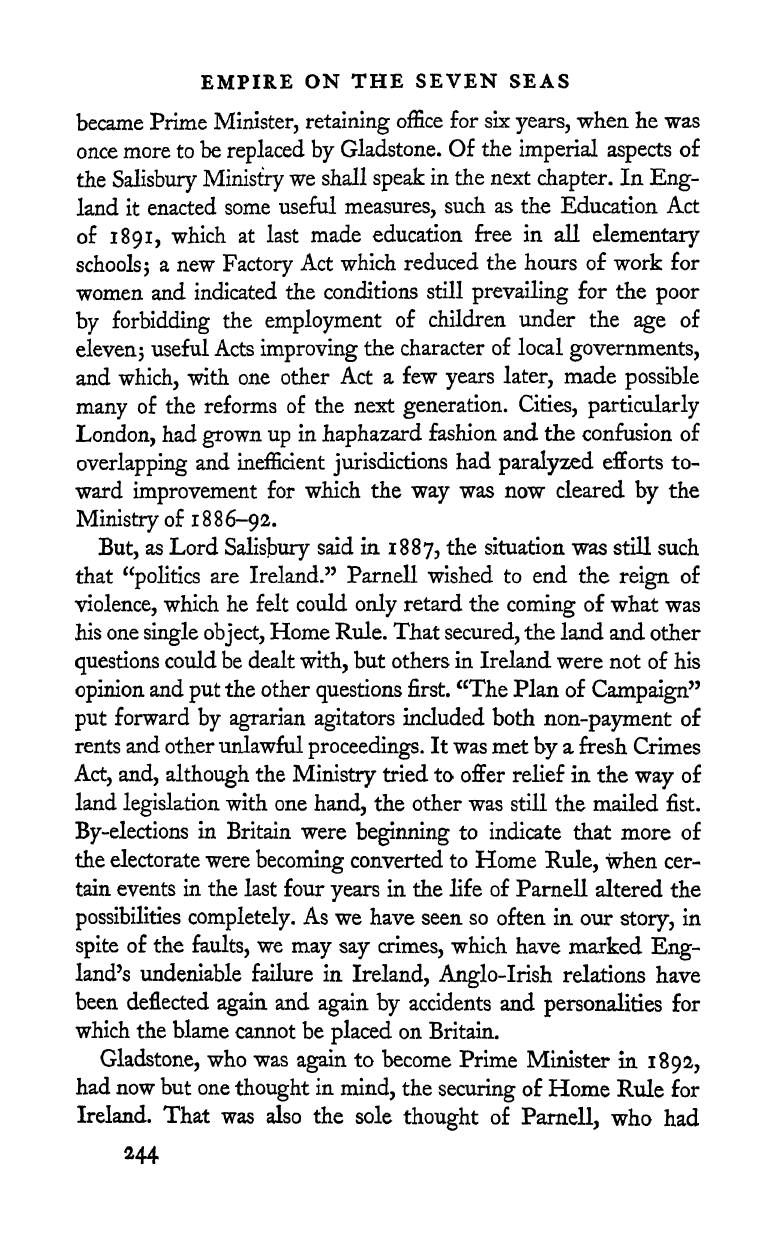
EMPIRE
ON
THE
SEVEN SEAS
became
Prime
Minister,
retaining
office for
six
years,
when he was
once
more to
be
replaced
by
Gladstone.
Of the
imperial
aspects
of
the
Salisbury
Ministry
we
shall
speak
in
the
next
chapter.
In
Eng-
land
it
enacted
some
useful
measures,
such
as
the Education
Act
of
1891,
which
at
last
made
education
free in
all
elementary
schools}
a new
Factory
Act
which
reduced
the hours of
work
for
women
and
indicated
the
conditions
still
prevailing
for the
poor
by
forbidding
the
employment
of
children under
the
age
of
eleven}
useful Acts
improving
the
character
of
local
governments,
and
which,
with
one
other
Act
a few
years
later,
made
possible
many
of the
reforms
of the
next
generation.
Cities,
particularly
London,
had
grown
up
in
haphazard
fashion and
the confusion
of
overlapping
and
inefficient
jurisdictions
had
paralyzed
efforts
to-
ward
improvement
for
which
the
way
was
now
cleared
by
the
Ministry
of
1886-92.
But,
as
Lord
Salisbury
said
in
1887,
the
situation
was still
such
that
"politics
are
Ireland." Parnell wished
to
end
the
reign
of
violence,
which he felt
could
only
retard
the
coming
of
what
was
his
one
single
object,
Home
Ride.
That
secured,
the
land and
other
questions
could be dealt
with,
but others
in
Ireland
were not
of
his
opinion
and
put
the other
questions
first.
"The Plan
of
Campaign"
put
forward
by agrarian
agitators
included
both
non-payment
of
rents
and
other
unlawful
proceedings.
It was
met
by
a
fresh
Crimes
Act,
and,
although
the
Ministry
tried to
offer
relief
in
the
way
of
land
legislation
with
one
hand,
the other
was
still
the mailed
fist.
By-elections
in
Britain
were
beginning
to
indicate
that
more of
the
electorate
were
becoming
converted
to Home
Rule,
when cer-
tain
events
in
the
last
four
years
in
the
life
of
Parnell
altered
the
possibilities
completely.
As
we have seen
so
often ia our
story,
in
spite
of the
faults,
we
may
say
crimes,
which have
marked
Eng-
land's
undeniable failure in
Ireland,
Anglo-Irish
relations
have
been deflected
again
and
again
by
accidents and
personalities
for
which
the blame
cannot be
placed
on
Britain.
Gladstone,
who
was
again
to
become
Prime
Minister
in
1892,
had now
but
one
thought
in
mind,
the
securing
of
Home Rule for
Ireland.
That was
also the
sole
thought
of
Parnell,
who
had
244
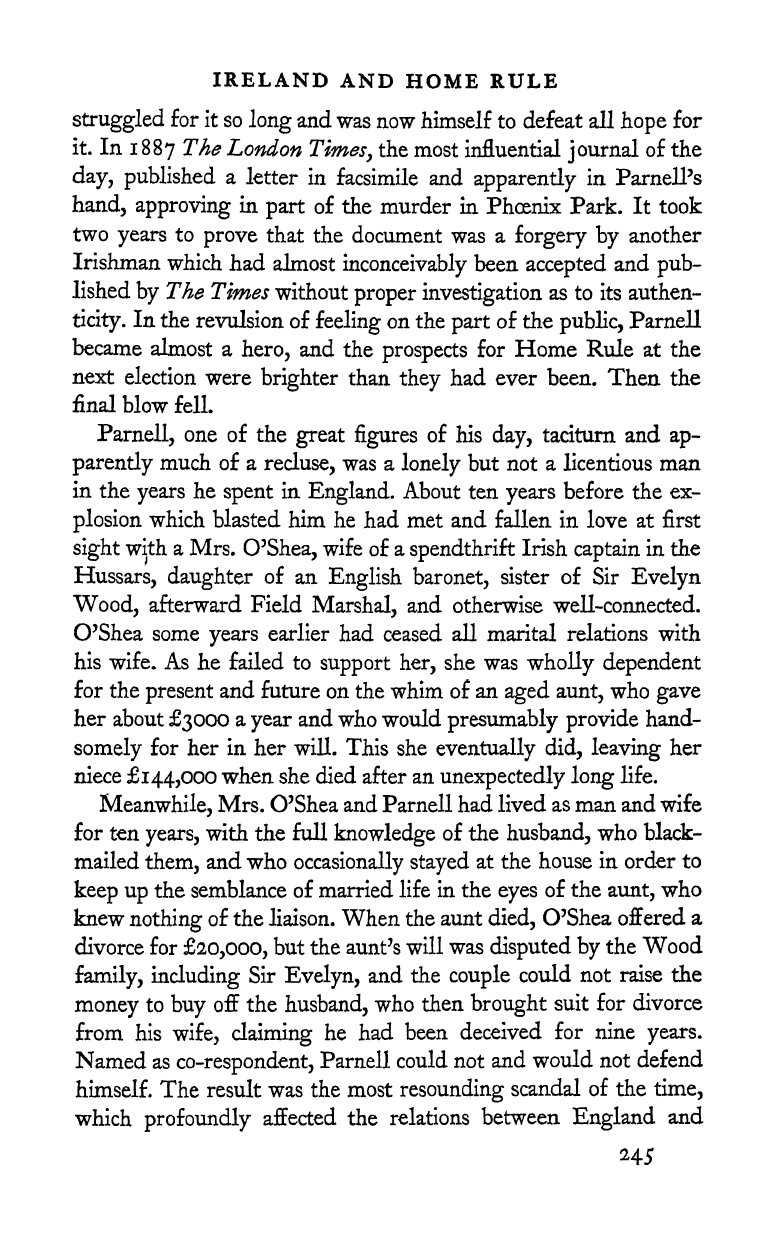
IRELAND
AND
HOME
RULE
struggled
for it so
long
and
was
now
himself to
defeat all
hope
for
it. In
1887
The
London
Times,
the
most influential
journal
of the
day,
published
a
letter
in
facsimile and
apparently
in ParnelPs
hand,
approving
in
part
of the murder
in
Phoenix Park.
It
took
two
years
to
prove
that
the
document was
a
forgery
by
another
Irishman
which
had
almost
inconceivably
been
accepted
and
pub-
lished
by
The
Times
without
proper investigation
as
to its
authen-
ticity.
In
the
revulsion
of
feeling
on the
part
of the
public,
Parnell
became
almost
a
hero,
and
the
prospects
for
Home
Rule at
the
next
election
were
brighter
than
they
had
ever
been.
Then
the
final
blow fell.
Parnell,
one of
the
great
figures
of
his
day,
taciturn
and
ap-
parently
much of
a
recluse,
was a
lonely
but not
a
licentious
man
in
the
years
he
spent
in
England.
About
ten
years
before
the
ex-
plosion
which
blasted him he
had
met and fallen in love
at first
sight
with
a
Mrs.
O'Shea,
wife
of
a
spendthrift
Irish
captain
in the
Hussars,
daughter
of
an
English
baronet,
sister of
Sir
Evelyn
Wood,
afterward
Field
Marshal,
and
otherwise
well-connected.
O'Shea some
years
earlier
had
ceased
all
marital
relations with
his wife. As
he failed to
support
her,
she was
wholly
dependent
for
the
present
and future
on
the
whim of
an
aged
aunt,
who
gave
her
about
3000
a
year
and
who would
presumably
provide
hand-
somely
for
her
in
her
will.
This she
eventually
did,
leaving
her
niece
144,000
when she
died
after
an
unexpectedly
long
life.
Meanwhile,
Mrs.
O'Shea
and
Parnell
had
lived as
man
and wife
for
ten
years,
with
the
full
knowledge
of the
husband,
who
black-
mailed
them,
and who
occasionally stayed
at the
house
in
order
to
keep up
the
semblance
of
married
life in
the
eyes
of
the
aunt,
who
knew
nothing
of
the liaison.
When
the
aunt
died,
O'Shea offered
a
divorce
for
20,000,
but
the
aunt's
will
was
disputed by
the
Wood
family,
including
Sir
Evelyn,
and the
couple
could
not raise the
money
to
buy
off
the
husband,
who
then
brought
suit
for divorce
from
his
wife,
claiming
he
had
been
deceived
for
nine
years.
Named as
co-respondent,
Parnell
could not
and would not
defend
himself. The
result
was the most
resounding
scandal
of the
time,
which
profoundly
affected
the
relations
between
England
and
245
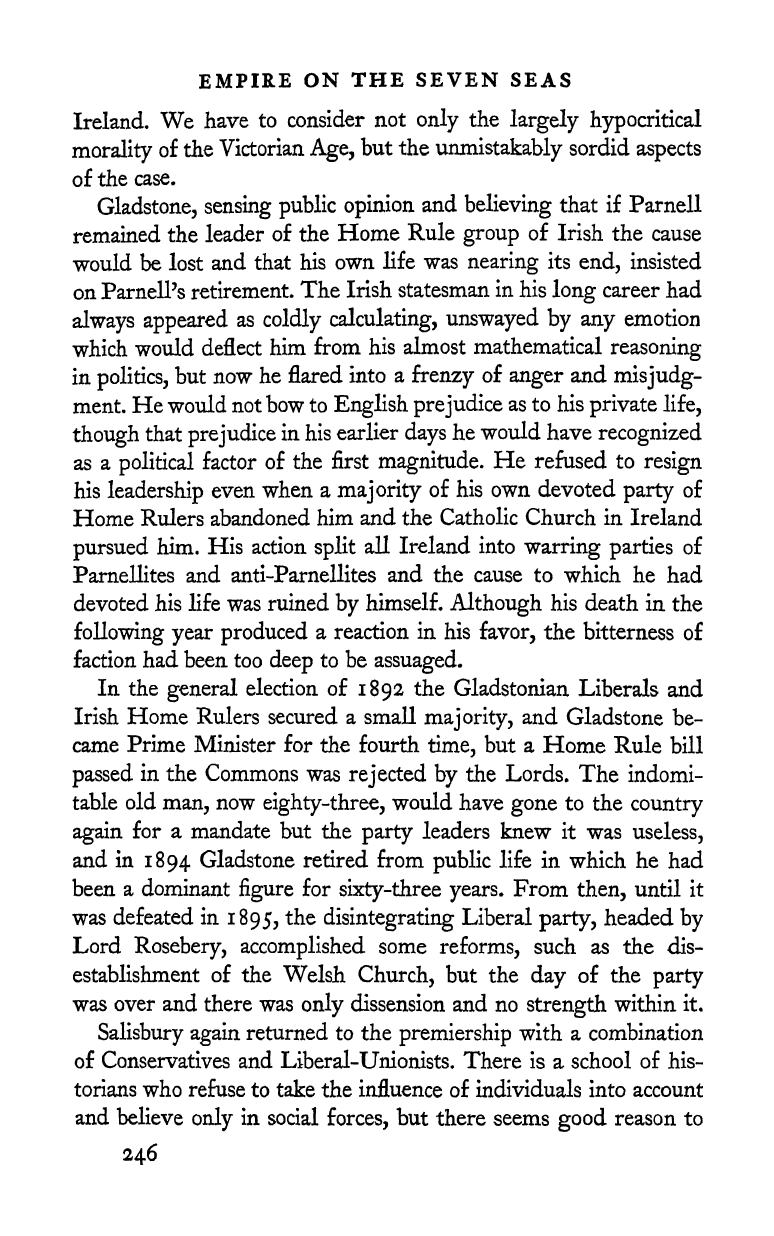
EMPIRE
ON
THE
SEVEN
SEAS
Ireland.
We have
to consider
not
only
the
largely
hypocritical
morality
of
the
Victorian
Age,
but the
unmistakably
sordid
aspects
of
the
case.
Gladstone,
sensing
public
opinion
and
believing
that
if
Parnell
remained
the
leader
of
the
Home
Rule
group
of
Irish the
cause
would
be
lost
and
that his
own
life
was
nearing
its
end,
insisted
on
ParnelPs
retirement.
The
Irish
statesman
in
his
long
career
had
always appeared
as
coldly
calculating,
unswayed
by
any
emotion
which
would
deflect
him
from
his
almost
mathematical
reasoning
in
politics,
but
now
he flared
into
a
frenzy
of
anger
and
misjudg-
ment.
He
would
not bow
to
English
prejudice
as to his
private
life,
though
that
prejudice
in his
earlier
days
he
would
have
recognized
as
a
political
factor
of the
first
magnitude.
He
refused to
resign
his
leadership
even
when
a
majority
of his
own
devoted
party
of
Home Rulers
abandoned
him
and the
Catholic
Church
in
Ireland
pursued
him.
His
action
split
all Ireland into
warring parties
of
Parnellites
and
anti-Parnellites
and
the
cause
to which
he
had
devoted his
life
was
ruined
by
himself.
Although
his death
in
the
following
year
produced
a
reaction
in
his
favor,
the
bitterness
of
faction
had
been too
deep
to be
assuaged.
In the
general
election of
1892
the
Gladstonian
Liberals
and
Irish Home
Rulers
secured
a
small
majority,
and
Gladstone
be-
came Prime Minister for
the
fourth
time,
but a
Home Rule
bill
passed
in the
Commons was
rejected
by
the
Lords.
The indomi-
table
old
man,
now
eighty-three,
would
have
gone
to
the
country
again
for a
mandate but the
party
leaders
knew it was
useless,
and
in
1894
Gladstone retired from
public
life in
which he
had
been
a
dominant
figure
for
sixty-three
years.
From
then,
until
it
was
defeated
in
1895,
the
disintegrating
Liberal
party,
headed
by
Lord
Rosebery, accomplished
some
reforms,
such
as the dis-
establishment of the
Welsh
Church,
but the
day
of
the
party
was over and
there was
only
dissension and no
strength
within
it.
Salisbury again
returned to
the
premiership
with
a
combination
of Conservatives and
Liberal-Unionists.
There
is a school
of
his-
torians who refuse
to take
the
influence
of
individuals
into
account
and
believe
only
in
social
forces,
but there
seems
good
reason
to
246
